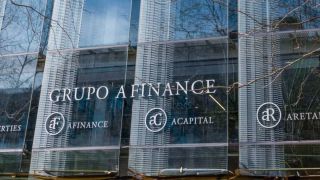
The increase in funding will hit companies by a double track
That the profitability of the listed debt is going to rise is not a secret for anyone. Corporate bonds have been making a dent in interest rates since Donald Trump won the US presidency and even earlier, when rumors began about the possible moderation in the Bank's rate of asset purchases European Central Bank
The rates will rise this year, but so will the premium paid on them.
The rates will rise this year, but so will the premium paid on them.
That the profitability of the listed debt is going to rise is not a secret for anyone. Corporate bonds have been making a dent in interest rates since Donald Trump won the US presidency and even earlier, when rumors began about the possible moderation in the Bank's rate of asset purchases European Central Bank.
The forecast is that it continues to evolve. The US Federal Reserve has started the way of raising official interest rates and, although in Europe this movement is not in any visible horizon, the contagion effect has not been waiting, which is accompanied by more promising forecasts of growth for The Old Continent and the rebound of inflation.
That implies a higher cost for companies that go to the bond market to be financed. But the impact will not only come through the way of interest rates. In an issue, there is another factor that weighs in the final price: the differential that companies have to pay on the reference interest rate (the mid-swap, if any). And that factor will also become more expensive.
"The spreads are going to rise this year for Spanish and European companies, impacted by the volatility in the market," says a director of an investment bank. "The uncertainties, particularly political ones, that Europe faces in the coming months will have an effect on the prices of financing," he adds.
But uncertainty will not be the only destabilizing element. Spreads have been artificially low during 2016 because of the impact of the ECB's corporate bond purchase plan, and this effect will gradually be diluted, according to several financial sources. Above all, because the central bank has already begun to reduce the weight of acquisitions in this segment and will do so more from April, when the overall amount of the program is lowered from the current 80,000 million euros per month to 60,000 million, In what the market has begun to call Mario Draghi's covert tapering.
"Long-term corporate bond spreads are not real," a market source says.
The remaining doubt is what are the differentials that companies should pay under unmanaged conditions and how they will evolve this year. Every investment bank has made its numbers and conclusions are different, but life will be more expensive for businesses from now on.
Bond yields are still very close to historical lows, so in the market it is considered that neither the rise in interest rate spreads nor the rise in interest rates will drive prices to levels that are inaccessible, at least for now. And for companies, the impact will be gradual, since their financing costs will not be affected until they emit the new prices and even then the process will gradually, as they have to renew their debt.
But that does not mean that companies are not trying to avoid or delay that rise as much as possible. Hence the strong volume of emission that is being in Spain and in Europe at this start of year, in anticipation that, as the months pass, prices will no longer be the same.
- Featured news
-
Consigue tu hipoteca ideal con ayuda experta y mejores condicionesAugust 11th 2025
-
 Incorporamos a Carlos Martín como nuevo Director de nuestra oficina de Barcelona en aFinanceSeptember 19th 2024
Incorporamos a Carlos Martín como nuevo Director de nuestra oficina de Barcelona en aFinanceSeptember 19th 2024 -
 Las finanzas bajo el foco con nuestro Director NacionalSeptember 12th 2024
Las finanzas bajo el foco con nuestro Director NacionalSeptember 12th 2024 -
 En aFinance participamos en el Evento ‘Comunicación Eficaz’ en Roca Barcelona GalleryMay 25th 2024
En aFinance participamos en el Evento ‘Comunicación Eficaz’ en Roca Barcelona GalleryMay 25th 2024 -
 En aFinance, nos complace anunciar la incorporación de Patricia Marqués como Coach EjecutivaMay 23rd 2024
En aFinance, nos complace anunciar la incorporación de Patricia Marqués como Coach EjecutivaMay 23rd 2024 -
 En aFinance hemos superado los 1.150 millones de euros en valor de transacciones durante 2023May 3rd 2024
En aFinance hemos superado los 1.150 millones de euros en valor de transacciones durante 2023May 3rd 2024






